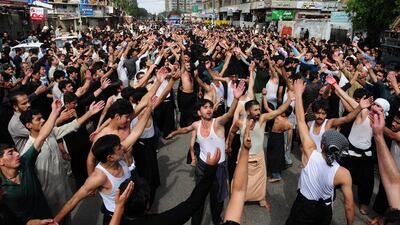This week, Muslim communities around the world noted the 10th of Muharram. It’s a special day in the calendar, rich in symbolism, allegory and imagery. For Muslims, it can represent the bringing together of different communities – or it can typify the divisions among them.
For all Muslims, it is a day to recall the freeing of the faithful from bondage in Egypt at the hands of a tyrant.
But there will be those who will take the day as a note of remembrance not only for what happened before the Prophetic period in 7th century Arabia – but after it as well. Among them will be many Sunnis – traditionally, most Sunnis – and also the Shia community. They will recall the freedom of the nation of the Prophet Moses – but they will recall the tragedy of the ending of the life of the Prophet Mohammed’s grandson, Imam Husayn.
It is not a happy story. It is a story that marks the apex of a certain period in Muslim history – the tipping point between the end of the era of the Rightly Guided Caliphs, and a very different phase. During that period, the other of the Prophet’s grandsons, Imam Hasan, relinquished his claim to the rule of the Muslim community in favour of the founder of the Ummayad dynasty, Muawiya.
Historians often reflect on the imam’s move as an example of a quietist political model – making a choice that reneges on one’s personal convictions in favour of silence in order to avoid widespread civil strife. It is a model that has been repeatedly used and abused in later history, with many religious personalities using the precedent as a basis for cosying up to institutions of tyrannical power. Imam Hasan’s approach wasn’t about apologising for tyranny – it was about being silent to diminish damage, which is very different from apologising for power. Medieval sages, such as Abu Hamid Al Ghazali, described such power-hungry religious personalities in the most unflattering of terms, regarding them as debased characters who will be punished in the hereafter in severe ways.
When Muawiya passed away, the leadership of the community went to his son, Yazid. His taking of the mantle was deemed to be tyrannical and unjust – and upon being called upon, Imam Husayn, the other of the Prophet’s grandchildren, rode forth to restore what Muslim historians universally recognise as not only his right, but his duty, as leader of the Muslim community. The massacre of him and his followers at the hands of supporters of Yazid will forever be etched in Muslim history as a grave turning point – where oppression resulted in the slaughter of the Prophet’s own grandson at the hands of the leaders of the Muslims.
That day is remembered with great sadness – but it is also poignant as a day of unity among Shias and Sunnis at the best of times. Many Shias remember the day in a very different way from Sunnis, but both recall the day as one where nobility and faith demanded sacrifice and holding steadfast. There will also be those who use and abuse that spirit – radical extremists who use such models to fight their political opponents. The recent catastrophe in Saudi Arabia’s Al Ahsa province, where five Shia Muslims were killed, and more than two dozen wounded, is a case in point where extremists will use religion for their own partisan ends. But Imam Husayn’s struggle was never for his own power – but to restore balance for the good of the community against a tyrant.
The lessons to be drawn from Imam Husayn’s life remain inspirational for many Muslims today. Cornel West, an African American intellectual, speaks often about a “prophetic pragmatism” – a pragmatism that is rooted in revolutionary zeal to push for the good, even though it may result in reformist, rather than revolutionary, action. Imam Husayn’s moves, however, ended not in reform – but in an outcome that still rouses many today.
So the tragedies continue in many places across the world. No less so than in Syria, where a revolutionary uprising has been subjected to the worst of sectarian manipulation. To the point where this week, a specifically Iranian and Iraqi Shia remembrance of Ashura was held in the streets of Damascus, an overwhelming Sunni city. The holding of it in this manner wasn’t spiritual but sectarian, with many of those commemorating serving in militias against the revolutionary uprising. The irony of a commemoration of the tragedy of Imam Husayn by those who are fighting to keep a tyrant in power.
The lessons of these two pivotal figures in Muslim history, the Prophet’s grandchildren, remain poignant for Muslim communities today. As the Middle East region continues to suffer from turmoil and crisis, one wonders whether there will be a time soon that these lessons against tyranny are learnt?
Dr HA Hellyer is an associate fellow of the Royal United Services Institute in London, and the Centre for Middle East Policy at the Brookings Institution in Washington DC
Twitter: @hahellyer


